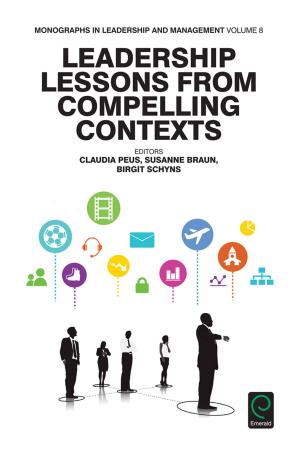Securing the Future of Management Education
Competitive Destruction or Constructive Innovation?
Business & Finance, Management & Leadership, Management, Nonfiction, Reference & Language, Education & Teaching| Author: | Howard Thomas, Michelle Lee, Lynne Thomas, Alexander Wilson | ISBN: | 9781783509140 |
| Publisher: | Emerald Group Publishing Limited | Publication: | January 6, 2014 |
| Imprint: | Emerald Group Publishing Limited | Language: | English |
| Author: | Howard Thomas, Michelle Lee, Lynne Thomas, Alexander Wilson |
| ISBN: | 9781783509140 |
| Publisher: | Emerald Group Publishing Limited |
| Publication: | January 6, 2014 |
| Imprint: | Emerald Group Publishing Limited |
| Language: | English |
This is the second of two volumes written to celebrate the 40th anniversary of EFMD. Drawing on interviews conducted with leaders in the world of management education, the first volume took a retrospective view, focusing on the evolution of management education and providing the context that led management education to where it stands today. It also synthesized respondents' views on the strengths and weaknesses of the field, the challenges it faces, as well as lessons learned and not learned from the past. This second volume similarly draws on the very rich data provided by the same respondents, but is future-oriented and takes on the theme of change. It provides the reader with a sense of the challenges on the horizon, potential blind spots, and new realities of an increasingly competitive environment. It discusses a range of alternative future scenarios for management education, and urges the field to resist the lures of the dominant paradigm and to develop new models instead. The authors contend that, given the challenges ahead, it is only through transformations and innovations that the future of the field can be secured.
This is the second of two volumes written to celebrate the 40th anniversary of EFMD. Drawing on interviews conducted with leaders in the world of management education, the first volume took a retrospective view, focusing on the evolution of management education and providing the context that led management education to where it stands today. It also synthesized respondents' views on the strengths and weaknesses of the field, the challenges it faces, as well as lessons learned and not learned from the past. This second volume similarly draws on the very rich data provided by the same respondents, but is future-oriented and takes on the theme of change. It provides the reader with a sense of the challenges on the horizon, potential blind spots, and new realities of an increasingly competitive environment. It discusses a range of alternative future scenarios for management education, and urges the field to resist the lures of the dominant paradigm and to develop new models instead. The authors contend that, given the challenges ahead, it is only through transformations and innovations that the future of the field can be secured.















